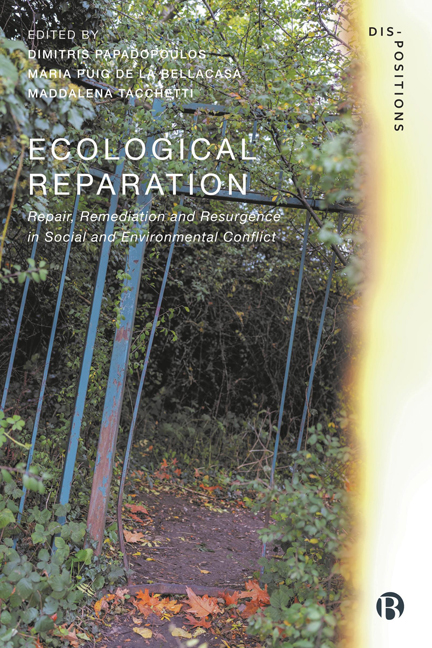Book contents
- Frontmatter
- Contents
- List of Figures
- Notes on Contributors
- Acknowledgements
- Note on the Figures
- Dis-Positions Series Preface
- Introduction: No Justice, No Ecological Peace: The Groundings of Ecological Reparation
- PART I Depletion<>Resurgence
- PART II Deskilling<>Experimenting
- PART III Contaminating<>Cohabiting
- PART IV Enclosing<>Reclaiming Land
- PART V Loss<>Recollecting
- PART VI Representing<>Self-governing
- PART VII Isolating<>Embodying
- PART VIII Growth<>Flourishing
- Index
18 - Commons-Based Mending Ecologies
Published online by Cambridge University Press: 28 March 2024
- Frontmatter
- Contents
- List of Figures
- Notes on Contributors
- Acknowledgements
- Note on the Figures
- Dis-Positions Series Preface
- Introduction: No Justice, No Ecological Peace: The Groundings of Ecological Reparation
- PART I Depletion<>Resurgence
- PART II Deskilling<>Experimenting
- PART III Contaminating<>Cohabiting
- PART IV Enclosing<>Reclaiming Land
- PART V Loss<>Recollecting
- PART VI Representing<>Self-governing
- PART VII Isolating<>Embodying
- PART VIII Growth<>Flourishing
- Index
Summary
Commons and the ecological repair
It appears evident today that the current capitalist mode of production based on the idea of ‘eternal economic growth’ is incompatible with the ecological limits of the planet. The ecological disaster is too big and complex to be solved by existing capitalist politico-economic structures. This is because, on the one hand, many of these structures have a direct interest in maintaining the current mode of production and, on the other hand, the existing way of making and implementing public policies doesn’t have the capacity to follow and react quickly enough to the rapid ecological deterioration of the planet.
In this context, the commons suggest an alternative solution. Commons are defined as a ‘social system in which resources are shared by a community of users/producers, who also define the modes of use and production, distribution and circulation of these resources through democratic and horizontal forms of governance’ (De Angelis and Harvie, 2014).
Being built on relations of collective care, regeneration, and resilience, the commons can contribute to the planetary ecological repair and provide an alternative to the extractive and exploitative relations of the capitalist economy. Learning how to govern our planet as a commons is part of the imperative of becoming more resilient, but also more democratic. As such, the ecological question should not only be tackled in relation to the environmental crisis, but also, as suggested by Guattari (2000), in relation to the social and politico-economic crisis and the prevailing mental ecology. It also needs to be addressed in post-anthropocentric terms, going beyond the human world towards more-than-human life worlds. An important amount of theoretical work has been done in this sense by anthropologists examining indigenous relations with nature and territory (Viveiros Castro, 1998; Rose, 2013; Tsing, 2015), or post-humanist and vital materialist theorists (Barad, 2003; Bennett, 2010; Papadopoulos, 2010; Puig de la Bellacasa, 2017). Commons can address all these questions in practice at different territorial scales and levels.
Within deprived neighbourhoods for example, commons offer an alternative to the current urban regeneration approaches. This alternative involves not only refurbishing derelict housing estates and renovating physical infrastructure but also repairing broken social relations, altered subjectivities, depleted imaginaries, unjust politics and uneven economics as well as empowering communities to participate in the repairing of their neighbourhoods and at the same time participate in the repairing of the planet.
- Type
- Chapter
- Information
- Ecological ReparationRepair, Remediation and Resurgence in Social and Environmental Conflict, pp. 275 - 288Publisher: Bristol University PressPrint publication year: 2023

